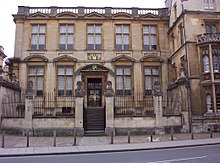Museum of the History of Science, Oxford

The Old Ashmolean Building as it stands today
|
|
| Established | 1683 (as Ashmolean Museum) 1924 (as Museum of the History of Science) |
|---|---|
| Location | Broad Street, Oxford, England |
| Coordinates | 51°45′16″N 1°15′19″W / 51.75443°N 1.25519°W |
| Type | University museum of the history of science |
| Director | Silke Ackermann |
| Website | Museum of the History of Science |
The Museum of the History of Science in Broad Street, Oxford, England, holds a leading collection of scientific instruments from Middle Ages to the 19th century. The museum building is also known as the Old Ashmolean Building to distinguish it from the newer Ashmolean Museum building completed in 1894. The museum was built in 1683, and it is the world's oldest surviving purpose-built museum.
The museum is open to the general public with free admission every afternoon except Mondays.
Built in 1683 to house Elias Ashmole's collection, it was the world's first purpose-built museum building and was also open to the public. The original concept of the museum was to institutionalize the new learning about nature that appeared in the 17th century and experiments concerning natural philosophy were undertaken in a chemical laboratory in the basement, while lectures and demonstration took place in the School of Natural History, on the middle floor. Ashmole's collection was expanded to include a broad range of activities associated with the history of natural knowledge and in 1924 the gift of Lewis Evans' collection allowed the museum further improvement, becoming the Museum of the History of Science and appointing Robert Gunther as its first curator.
The collection and the building itself now occupies a special position in the study of the history of science and in the development of western culture and collecting. One of the most iconic objects in the collection is Einstein's Blackboard that Albert Einstein used on 16 May 1931 in his lectures while visiting the University of Oxford, rescued by dons including and E. J. Bowen and Gavin de Beer.
...
Wikipedia

